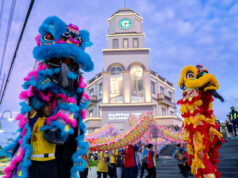Their point of convergence: the Ligligan Parul, the City of San Fernando’s signature festival that makes a truly magical night of kaleidoscope swirls of lights and colors dancing to festive music from brass bands, live or canned.
Better known as the Giant Lantern Festival, Ligligan is a truly gigantic celebration of the over-a-century-old tradition of lantern-making in the capital city, befitting its claim as the country’s Christmas Capital. That thousands of bewitched tourists, local and foreign, trooping to Robinsons highly affirm. That photo spreads of the lanterns in the front pages of national papers, that lengthy airtime provided the event on national primetime TV and livestreaming readily confirm.
At the core of the festival though is the fierce competition “pitting aesthetic and technical skills” among the city’s lantern artisans for the most coveted “Best Lantern Award.” Not so much for the monetary prize – a certainly untitanic P150,000 this year – as for the bragging rights guaranteed for one whole year.
This year’s winner Barangay Dolores had much more rights to brag about – having achieved the festival’s grand slam for winning in the last three consecutive years, and therefore its elevation as the first in the festival’s Hall of Fame.
Truly mesmerizing is the Dolores entry, to say the least. No words can fully capture the sight one beholds at each turn of the hidden rotor that makes its lights wink, fl ash, dim, dance, blink, and scores, mayhaps, hundreds, more myriad movements.
Mesmerizing. Aye, spellbinding, the giant lanterns are. To the point that they have become sole attractions, in, of and by themselves. Us, the bedazzled, utterly enchanted, thoroughly tranced, to still bother ourselves with what they, by their very origin, represented.
Pray, who still knows the meaning of the Christmas lantern?
Tell, who cares?
Might as well be eons ago since learning from my high school theology professor – the then-Rev. Fr. Paciano B. Aniceto – that the Christmas lantern took after the Star of Bethlehem that pointed to where the Christ was born and thereby guided both lowly shepherds and majestic magi to the manger. Thus:
After they had heard the king, they went on their way, and the star they had seen when it rose went ahead of them until it stopped over the place where the child was. When they saw the star, they were overjoyed. On coming to the house, they saw the child with his mother Mary, and they bowed down and worshiped him. Then they opened their treasures and presented him with gifts of gold, frankincense and myrrh. (Matthew 2:9-12)
Hence – the good Apu Ceto explained – wherever the Christmas lantern is hoisted, posted or hung, there the Christ is, there His love is. The lantern being the Star’s representation.
Of all the symbols of Christmas – from mistletoes and Christmas trees to Santa Claus and the snowman – it is the lantern then that has the greatest, if not the only, theological value – the sublime symbolism of love, the greatest manifestation of God’s love born man to redeem mankind. Thus:
In the beginning was the Word, and the Word was with God, and the Word was God… The Word became flesh and made His dwelling among us. (John 1: 1, 14)
Are we even remotely aware of this when we ooh and aah in wonderful glee at the giant lanterns’ kaleidoscopic plays?
Ay, with the giant lanterns, the medium has morphed into the very message.
Indeed, with the giant lanterns, the symbols have become the object itself.
The essence of the Star not only demeaned, but moreso debased, defiled. Cry blasphemy! Cry sacrilege! But who shall listen? Who still cares?
“And the people bowed and prayed, to the neon gods they made…” Simon and Garfunkel sounding the silence of muted prophets there.
A Christmas past I feel, writing all about this again, and again. Yet… again.
So I make myself nothing less than the miserly Scrooge, or nothing more than the wily Grinch stealing the X-mas present of frenzied shopping rush causing all those monstrous traffic jams around the malls, of compulsive consumption, offered as it were at capitalism’s unholy shrines, of the attendant cacophony of sounds – from the consumer noise to the piped-in carols – fading below the din of tinkling cash registers, sweet, sweet music to the Forbes’ listers ears.
Without the Christ, there’s only X-mas utterly secularized.
Without the Christ, there’s only X-mas crassly commercialized.
Call me the sanctimonious killjoy, the X-mas spoiler.
Or Tomas de Torquemada I may actually be, still, it does not a Christmas make out there.
So we may sing “Joy to the world” with all our lungs, till our voices crack.
But then what lord has come to us?




